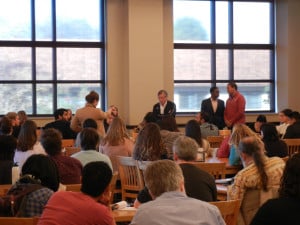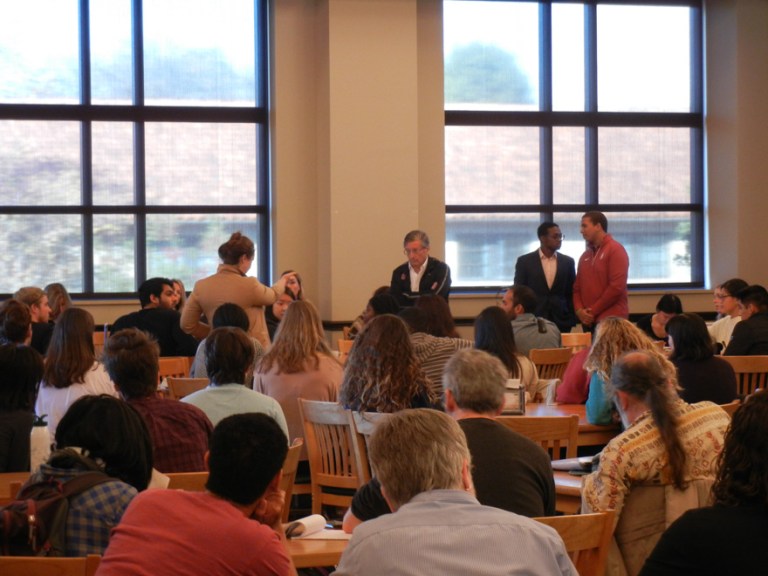
On Friday, ASSU Executives John-Lancaster Finley ’16 and Brandon Hill ’16 hosted a town hall on the topic of campus sexual assault with Provost John Etchemendy Ph.D. ’82 and other administrators. Students, faculty and community members gathered in Arrillaga Dining at 8:30 a.m. for a conversation about potential changes to University policies for reporting sexual assault after the Provost’s Task Force on Sexual Assault issued its report in April.
“[Finley and I] believe in the power of exchange and hoped that an open town hall would provide a venue for clear, honest conversation to happen about the University’s work on ending sexual violence,” Hill wrote in an email to The Daily.
The provost offered opening remarks, discussing the new student Title IX process. The Task Force published a report last April on the issues relating to sexual violence on the Stanford campus and recommended specific actions to improve both the systems in place for reporting sexual assault as well as educational programs aimed at prevention.
According to Etchemendy, one of the Task Force’s recommendations involved a new process for adjudicating sexual assault cases, which will likely be put into place during winter quarter 2016. The implementation team has also redesigned support structures for survivors of sexual assault.
Multiple administrators, including Etchemendy, expressed their desire during the event to hear from students about the recommendations in the Task Force’s report so that the implementation team can make adjustments and improvements based on the responses. After hearing from the community about the new adjudication process, the University president will have to read and approve the proposal. There will then be a two-to-three year trial period for the new process.
New policies
Mary Elizabeth Magill, dean of the Law School and co-chair of last year’s Task Force, discussed the committee’s recommendations and the next steps for implementation. She will chair the ongoing oversight committee that will be checking in on the implementation process.
According to Magill, the Task Force focused on investigating University efforts to educate the community on sexual assault prevention, provide support for survivors, and investigate and adjudicate reports of incidents on campus. Based on their findings, the team recommended solutions that would improve the University’s efforts on these three fronts.
“The Task Force…moved as quickly as it could to try to put new recommendations in place as soon as possible,” Magill said.
The Task Force found that current educational efforts focused too much on freshmen, especially during New Student Orientation (NSO). The team instead recommends more education for all members of the community, including targeted programs for undergraduates and graduate students based on their unique needs.
The team also found that there was “more need for confidential support…and knowledge about where to go [for help],” Magill said. The need for an improved support system for survivors of sexual assault was a common topic among the administrators and the students and community members who asked questions.
To help improve the investigative and adjudicative process, the team recommended the panels who oversee investigations to be more “diverse and extensively trained,” Magill said. The team recommended that undergraduates should no longer be on the panel, although graduate students may be considered.
The Task Force also examined potential punishments for students found guilty of sexual assault.
“We recommend that expulsion be the default sanction,” Magill said.
She next talked about how to maximize fairness in the adjudicative process. The new system will also provide for up to six hours of legal advice for involved students, and high-level sanctions like expulsion will require unanimity among the panel.
Q&A
Finley and Hill then opened up the floor to questions.
The first came from a student wondering about how the policies would affect transgender or gender-nonconforming students who are victims of sexual assault.
“One of the most disturbing things we found was the level of unhappiness in the trans community,” Etchemendy said.
The provost told the student he is scheduling a meeting with members of the trans community to find out what the team can do specifically to support them in this process.
“This year we’ll try to make [education on gender identity issues] much more integrated into what staff and faculty understand about their students,” said Stephanie Kalfayan, Vice Provost for Student Affairs.
Concern over climate survey statistics
Multiple students raised questions concerning the campus climate survey conducted at the end of last year and the way the University has publicized the statistic that 1.9 percent of Stanford students have been sexually assaulted on campus.
One Ph.D. student called the statistic “insulting as a woman and also as an academic.”
A few students called for an apology from the University or an acknowledgment that publicizing the 1.9 percent statistic was a mistake.
“We need to have concern and awareness, and people need to feel this is a compelling issue that they need to worry about,” said one student who mentioned that, as an RA, she has already dealt with two cases of sexual violence among her residents within two months. “These numbers lie in the face of that and could hinder educational efforts.”
One student questioned why she should trust the University, because she feels administrators, Etchemendy included, have downplayed the severity of sexual assault at Stanford compared to other universities in the country.
“I never, ever said we have less sexual assault or sexual misconduct than other universities,” Etchemendy said. “The overall rates are extremely high…here and high at every other university that’s done a survey.”
“We are not proud of the rates of sexual assault,” he said.
Defining sexual assault and sanctions
Other students inquired about Stanford’s definition of sexual assault or misconduct and how policies related to expulsion will change.
“Why does Stanford have the narrowest definition of sexual assault in the country?” asked one student.
Administrators’ responses focused on how expulsion as a sanction is an essential part of how Stanford defines sexual assault. The Task Force recommended a change in policy to make expulsion the default punishment for perpetrators.
“Our sexual assault definition, based on the Task Force recommendations, ties to expulsion, so assume that [alleged perpetrators] face expulsion for any act of [sexual violence],” Lauren Schoenthaler, senior University counsel and leader of the new Confidential Support Team, said.
Changes to the reporting process
One student discussed her personal experience with the reporting process. She explained that instead of bringing her case to a panel for review, she was offered a “plea deal.”
“You were trying to push my case under the rug so you didn’t have to go through a hearing for your panel,” she said to Etchemendy.
“We have no interest in scooping anything under the rug,” Etchemendy said. “The idea that we want to hide any of this is crazy.”
Another student joined the conversation, explaining that even if the University has no desire to sweep things under the rug, that’s how students feel.
“Going forward, it’s going to look different,” Schoenthaler said.
Schoenthaler mentioned that the new system will allow for personalized timelines for each individual case to take into account academic or personal schedules. A previous policy mandated that investigations be completed in 60 days.
Stephanie Pham ’18 asked what kinds of accommodations will be provided for students who choose not to formally report an incident. Schoenthaler discussed the new Confidential Support Team, which will work with students on issues such as finding alternative housing away from their assaulters and dealing with cases in which a survivor and an assaulter take the same academic class.
Improving education
Ari Kelman, an associate professor at the Graduate School of Education and a resident fellow in a freshman dorm, asked about how to integrate sexual assault education into the Stanford curriculum.
“Formal classes should be required,” he said.
Etchemendy agreed that a curricular requirement is a good idea. Kelman then asked if he’d have Etchemendy’s support if he proposed a new requirement and course to the Faculty Senate. The provost said he would.
The provost also noted that he’d like to see education delivered to students by students. He admitted the educational efforts aimed at freshmen during NSO are not the most effective, and he called for programs in residences that would be throughout the year and for all students.
A senior ASSU cabinet member talked about a new peer education program in which students train under the SARA office. The pilot program will begin this spring, and the ASSU and Etchemendy have been working together to develop a comprehensive curriculum.
“I hope some of you will volunteer and train and participate,” the provost said. “It’s an exciting initiative.”
Continuing the discussion
Schoenthaler emphasized the Task Force’s desire to hear feedback from students on the new policies so that they can improve them. One student called for another town hall to discuss the policies further, and Schoenthaler agreed.
“John[-Lancaster Finley] and I saw the town hall as a tangible milestone forward where students got to express some of their fears, frustrations, and focal points on this issue,” Hill said in a statement to The Daily.
“We are not fooled that the town hall is a substitute for real progress on the topic of sexual assault,” Hill added. “[We] are ready to work along survivors, activists, allies, and administration to execute on our mutual missions this year.”
“The level of sexual assault we have on campus is unacceptable,” Etchemendy said. “Any level is unacceptable. We need to do better for victims who go through trauma, and we know that.”
Contact Sarah Ortlip-Sommers at sortlip ‘at’ stanford.edu.
